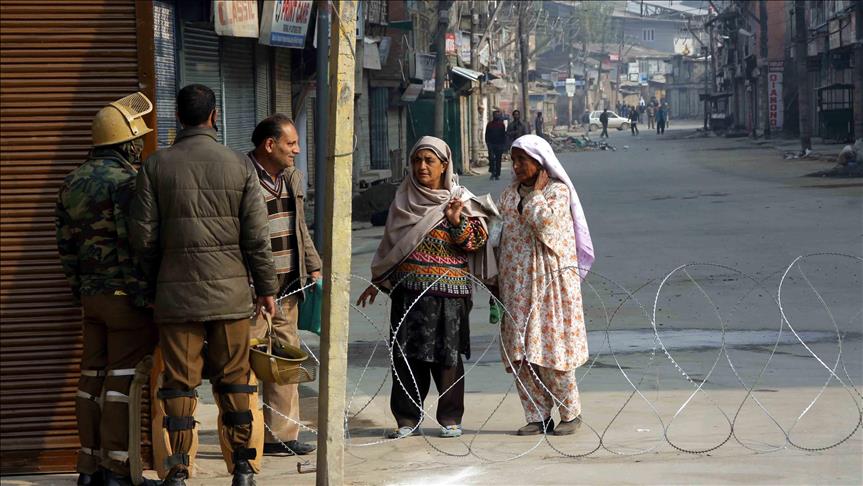Hindu party targets Rohingya in Jammu-Kashmir campaign
Jammu and Kashmir National Panthers Party incites people against Myanmar's Muslim refugees, calling their presence a threat
 File photo
File photo
By Zahid Rafiq
SRINAGAR, Jammu and Kashmir
A Hindu nationalist political party has launched a systematic campaign calling for the expulsion of Myanmar’s Muslim Rohingya refugees from Jammu and Kashmir, terming their presence in the region an existential threat.
The Jammu and Kashmir National Panthers Party has installed large billboards across the Hindu-dominated Jammu city and its outskirts in the last one week, inciting the people against the Muslim refugees and claiming their presence supposedly dilutes the ethnic identity of Dogras -- a Hindu community that ruled Kashmir before India seized control of a part of the disputed region in 1947.
Analysts believe the Jammu-based political party, which has no representation in any regional assembly or the country’s parliament, aims to inflame passions among the Hindus in the region through such acts.
Moreover, just like the Myanmar authorities who describe the persecuted Rohingya community as Bangladeshis in order to portray them as people not worthy of citizenship, the Panthers party too was using the same term for them.
One billboard in Jammu city read: "Wake up Jammu. Rohingyas, Bangladeshis, Quit Jammu. Let us all Jammuites unite to save the history, culture and identity of Dogras."
The billboards are part of a systematic campaign spearheaded by Harsh Dev Singh, chairman of the Panthers Party.
On Jan. 29, Singh and other members of his party also took to the streets wearing black banners that read: “Bangladeshi and Rohingya immigrants quit Jammu”.
In remarks made to Anadolu Agency, Singh said: "It is not communal politics as it is being represented in the Kashmiri press but we are not in favor of foreigners settling here. You see these Rohingyas and Bangladeshis everywhere and they are a security threat.”
Other officials, however, contradict the claims of threats due to Rohingya in the region. India’s Jammu and Kashmir Chief Minister Mehbooba Mufti told the regional assembly recently that 5,743 Rohingya community members were staying in the region and no instances of radicalization had been reported from among them so far.
Moreover, while the Panthers demand the complete removal of the Muslim Rohingya community, it ironically also calls for overriding the Kashmiri constitution and granting Kashmiri citizenship to Hindu refugees who had fled to Jammu and Kashmir following the end of British colonial rule and creation of new states of Pakistan and India in 1947.
"The West Pakistani refugees are Indian citizens and they must get Kashmiri citizenship too. It doesn't matter that they are not citizens of Kashmir according to the Article 370," Singh said.
Pakistan used to be split geographically between West Pakistan and East Pakistan. After the 1971 war of independence, East Pakistan later became Bangladesh.
The granting of citizenship to refugees from Pakistan, who arrived in Jammu and Kashmir from Pakistani city of Sialkot in August 1947, is also part of the Kashmir agenda of the Bharatiya Janta Party (BJP) -- a rightwing Hindu political body that currently rules India and is also in a coalition government in Jammu and Kashmir.
The BJP also finds support in several Jammu-based parties like Panthers party. For Kashmiri Muslims, issue of citizenship to Hindu refugees from Pakistan symbolizes an attempt by the Indian state to make their community a minority in their own homeland.
Kashmir, a Muslim-majority Himalayan region, is held by India and Pakistan in parts and claimed by both in full. A small sliver of Kashmir is also held by China.
The two countries have fought three wars – in 1948, 1965 and 1971 – since they were partitioned in 1947, two of which were fought over Kashmir.
Kashmiri resistance groups in Jammu and Kashmir have been fighting against Indian rule for independence, or for unification with neighboring Pakistan. More than 70,000 people have reportedly been killed in the conflict since 1989. India maintains more than half a million troops in the disputed region.
Anadolu Agency website contains only a portion of the news stories offered to subscribers in the AA News Broadcasting System (HAS), and in summarized form. Please contact us for subscription options.

